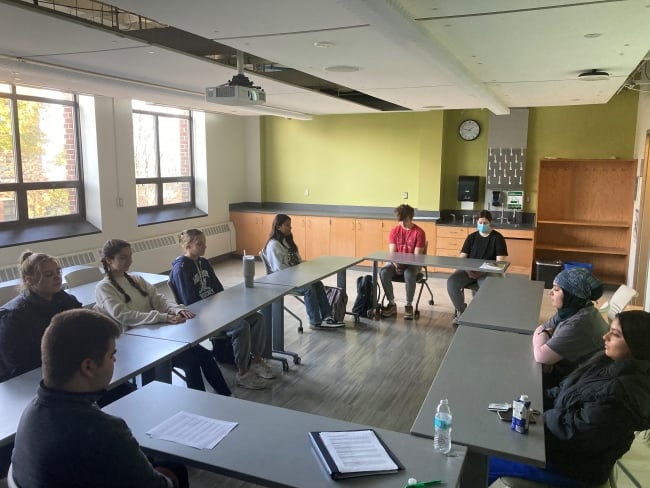You have /5 articles left.
Sign up for a free account or log in.

Students at Le Moyne College can opt in to a one-credit resiliency course, learning about growth mind-set, character strengths, cognitive reframing and more.
Le Moyne College
A $300,000 grant from the Booth Ferris Foundation is funding a new initiative at Le Moyne College in upstate New York to improve students’ emotional and mental well-being through academic and community programming. The program, Building Resiliency Among Peers, will teach around 600 undergraduate students resiliency skills, and around 30 students per term will be recruited as wellness ambassadors, working to equip their peers and young people locally with the same information.
The two-year grant program launched this fall and will run through the 2024–25 academic year.
What’s the need: A fall 2022 Healthy Minds Study at Le Moyne found over 65 percent of students wanted some help for emotional or mental health problems in the prior year, and more than half of students found their academics were negatively impacted by emotions or mental difficulties for three days or more.
Additionally, 60 percent of students reported being diagnosed with generalized anxiety disorder by a professional, compared to 37 percent of students nationwide in the Healthy Minds student study in 2021–22. Thirteen percent of Le Moyne students shared that they seriously thought about ending their lives, compared to 15 percent nationwide.
Le Moyne has a counseling center that supports students in crisis, but the current counselor-to-student ratio is one to 914.
To address the high need for mental health services and better assist students before a point of crisis, officials created the Dolphins Changing Minds curriculum.
How it works: Dolphins Changing Minds has a few goals: to reduce stigma around seeking help when in crisis, to create a campus culture of resiliency and to model and influence student behaviors around managing tough feelings.
Six student affairs professionals teach the one-credit course, including Anne Kearney, dean of student well-being, for a total of six section offerings for the fall.
Course content includes the science of developing and changing habits, growth mind-set, character strengths, cognitive reframing, emotional regulation, self-compassion, sleep, food and mood, physical activity and exercise, empathy in relationships, and common humanity and mindfulness. To successfully pass the course, students are held to strict attendance requirements and must complete weekly written reflections.
Scaling up: After completing the first class of Dolphins Changing Minds, students who pass are eligible to serve as wellness ambassadors to local high schoolers. The program, Dolphins Spreading HOPE! (Health, Optimistic, Positive Experience) will officially launch in January and run through spring 2025, dependent on grant funding.
Dolphins Spreading HOPE! is also funded by a $30,000 Health Equity Innovation Award from Excellus BlueCross BlueShield to address health disparities in upstate New York.
Le Moyne will partner with the Greater Central New York Chapter of the American Foundation for Suicide Prevention to deliver Dolphins Spreading HOPE! to at least two high schools in every participating county, including Cayuga, Cortland, Onondaga, Oswego and Tompkins Counties.
Ambassadors will participate in panel discussions, large group information sessions, individual classroom sessions and local community events to increase connections, increase help-seeking behaviors, offer guidance about resiliency and increase hope among young people. Additional ambassador training modules, to be completed before the high school visits, will cover suicide prevention and job expectation skills. Ambassadors will work between three and 10 hours per week and will receive compensation for their work, either through Federal Work-Study funding or grant dollars.
What’s next: The college will offer eight sections in spring 2024 with a goal of enrolling 150 students each term through May 2025, when the grant funding ends.
Le Moyne staff intend to evaluate the short- and long-term impacts of the initiatives, gauging effects on student mental health, sense of well-being, retention, progress toward degree completion and medical leave of absence data.
“If these interventions help move students in positive directions,” Kearney says, “I am confident that after the grant periods end … the college will decide to support these initiatives, perhaps even on a broader scale.”
If your student success program has a unique feature or twist, we’d like to know about it. Click here to submit.




